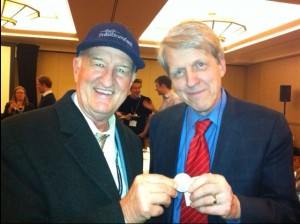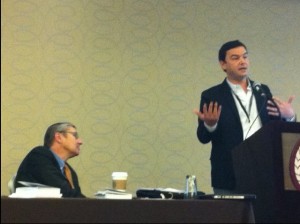The World’s Most Dangerous Tax
I attended the American Economic Association (AEA) meetings in Boston during the past weekend, and the session on possible “secular stagnation” in the United States was standing-room only. Prominent economists, including Larry Summers, former Secretary of the Treasury and president of Harvard University, pointed to several negative trends in America: lower productivity, decline in new businesses, high household debt, slowing population and a persistent decrease of the economic growth rate.
I also spent some time with Nobel Prize economist Robert Shiller (Yale University), who predicted both the dot-com bust in 2000 and the real estate collapse in 2007/08, and he remains pessimistic about stocks and real estate.
The doom-and-gloomers express legitimate concerns. But as one economic historian pointed out, the same fears were expressed by Alvin Hansen at the 1938 AEA meetings, just before these trends reversed themselves and we enjoyed a new burst of economic success.
Never count America out! I found it ironic that this debate was taking place in Boston, the center of the biotech revolution that is booming right now with new drugs and initial public offerings (IPOs) coming out.
We will debate this issue at FreedomFest. Economist Gregory Clark (University of California-Davis) and Alex Green (Oxford Club) will argue whether “The American Dream is Lost.” Clark says “Yes,” Green says “No.” I’m sure similar issues will come up when Steve Moore (Heritage Foundation, Wall Street Journal) debates another Nobel Prize winner, Paul Krugman (New York Times).
Special Note: For those who were away during the holidays, we have extended the “early bird” discount to FreedomFest until Jan. 15, but that is the final deadline. You won’t want to miss this year’s show and debates. Register at www.freedomfest.com, or call 1-855-850-FREE.
Why A Progressive Tax on Income and Wealth is the Most Dangerous Tax
The other session I attended in Boston was a debate with Thomas Piketty, the French author of the bestseller “Capital in the 21st Century.” I think his book should be called “Anti-Capital.” He argues that the gap between rich and poor is getting so bad that it will destroy “democratic capitalism.” He recommends sharply higher progressive taxes on both income and wealth. This is by far the worst kind of tax for several reasons. First, it is a tax on capital, the engine of economic growth. Transferring money from the productive private sector to the unproductive public sector is a recipe for disaster.
Another risk is that once you adopt progressive taxation, there is no limit to how high the tax rate could go on the world’s most productive citizens. Even Lanny Ebenstein, a biographer of Hayek and Friedman, has been seduced into thinking progressive taxation up to 99% on the super wealthy is a good idea!
The problem is that once you agree on a progressive tax, you can never legitimately determine the ideal level of progressivity. You don’t want a situation where everyone earned the same amount of income, because that would destroy the economy. (How can you pay someone to work for you when you earn the same amount for not working?) And you don’t want one person to have all the money, because that would mean everyone else starves. Neither extreme is ideal. But what is the ideal balance? It’s impossible to say.
The best book ever written on the progressive tax is “The Uneasy Case for Progressive Taxation,” by Walter Blum.
At the session, I raised the argument that inequality depends on how you measure it. Yes, income and wealth inequality may have increased, but if you look at goods and services, inequality has probably decreased with the fact that almost all Americans, including the poor, have decent cars, smartphones and HD TVs. I have debunked his arguments in this review.
A New Year’s Resolution:
How to Do Good and Help Improve the Image of the Wealthy
The latest Barron’s has a column by Gene Epstein on my “Social Security Pledge.” Several years ago, I suggested that wealthy retirees who don’t need to live on Social Security should donate their Social Security checks to their favorite charity through automatic withdrawals from their bank account. Gene donates his $3,000 a month check to the Reason Foundation. You can read this column here.
You Blew It! Billionaire’s Wife Rejects $1 Billion Check in Divorce
Divorce can bring out the worst in people — bitterness, greed and regret in the case of the 26-year marriage between Harold Hamm, the chief executive of oil driller Continental Resources, and his former wife. She just refused a check for $974.8 million. She wants more from an estate that is dwindling by the day with lower oil prices.
The lawyers said Sue Ann Arnall did not want to accept the check for fear of hurting her appeal for even more money. Hamm had borrowed funds to ensure there would be enough cash in his account to cover it. But no matter, she seems hellbent on getting all of the Hamm fortune, or what’s left of it, which largely was made from the fracking revolution.
Arnall, a former Continental executive who was married to Hamm for 26 years, contends that her award of around $1 billion in cash and assets was inadequate and allowed Hamm to keep the lion’s share of a fortune her lawyers valued as high as $18 billion (much less now). Hamm already had paid his former wife more than $20 million during the divorce proceedings.
Hamm contends his Continental stake, which he owned before meeting Arnall, surged in value during the marriage due to “passive” or market factors, like rising oil prices.
Oklahoma law says only marital wealth stemming from active efforts or skills of either spouse should be split in a divorce.
The appeals risk dragging Hamm and his Oklahoma City-based oil company deeper into a divorce battle that is already in its third year. The fight has entailed tens of millions of dollars in costs and a 10-week trial that ended in October. Meanwhile, Hamm’s company has lost substantial market valuation during the past month.
In case you missed it, I encourage you to read my e-letter column from last week on Eagle Daily Investor about an incredible prediction for 2015. I also invite you to comment in the space provided below my Eagle Daily Investor commentary.
Good investing, AEIOU,
![]()
Mark Skousen
Presidential Fellow, Chapman University
Wikipedia
Newsletter and trading services
Personal website
Upcoming Appearance
Join me for the World MoneyShow in Orlando, Florida, Feb. 5-7 at the Gaylord Palm Resort & Convention Center. To register for free admission to the investment conference, call 1-800-970-4355 and mention you are my subscriber. Use priority code 037575.



